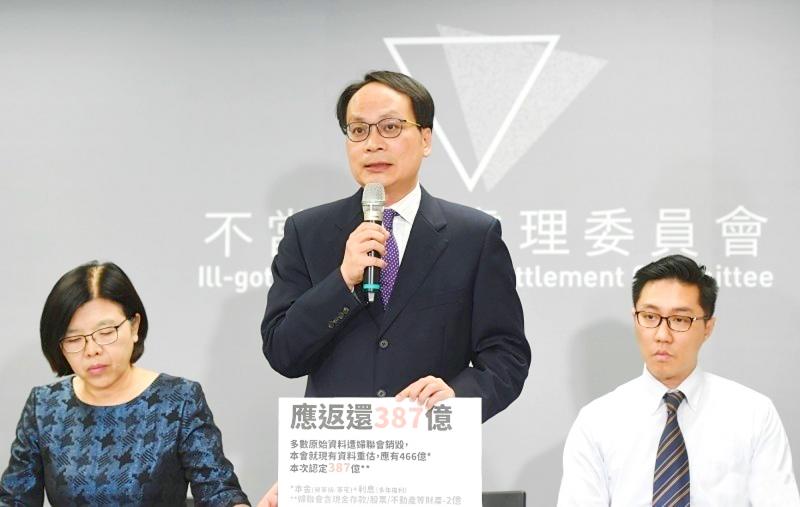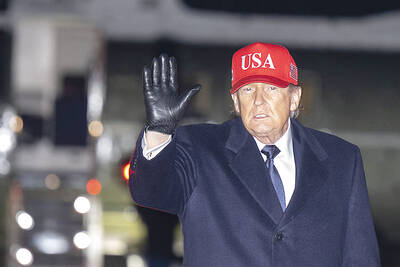The Ill-gotten Party Assets Settlement Committee said that its initial investigation found that the plots of land housing multiple Chinese Nationalist Party (KMT) service centers across the nation were illegally acquired during the Martial Law era.
The party resold many plots of land and service centers to party-affiliated businesses in 2008, said the committee, which is responsible for the investigation and return of ill-gotten party assets obtained during the Martial Law era from 1949 to 1987.
During this period, thousands of critics and political dissidents that the then-KMT regime perceived as threats to its one-party rule were suppressed, imprisoned or murdered.

Photo: Chen Yu-fu, Taipei Times
The KMT in 1987 purchased the land on which it built the KMT Nuannuan Service Center from the Keelung City Government, the committee said.
The law states that the land, which was part of an urban development project at the time, should have been sold via public bidding or allocated for public use, it said.
However, the city government sold it to the KMT, which used it for its own ends, and even resold it in 2008 to Kuang-Hwa Investment Holding Co, a KMT-affiliated company, it said.
The KMT Gaoshu Service Center in Pingtung County’s Gaoshu Township (高樹) was built in the 1950s on a piece of township-owned land that the KMT had “occupied,” it said.
In February 1983, the KMT “demanded” that the Gaoshu Township Office sell the land, or give it to the party for free as it “needs” the land, it said.
Although the Pingtung County Government had warned the office that selling the land would be illegal, the office sold it to the KMT below the declared land value, it said.
The KMT in 2008 resold the land and property to Kuang-Hwa Investment, it added.
The land housing the KMT’s service center in Yunlin County’s Dongshi Township (東勢) was also purchased in 1981 after having been “occupied” first, it said.
Although there was no legal basis to support the way the KMT “purchased” the plot, the Executive Yuan in 1983 approved “special projects” that authorized the transaction, it said, adding that “anything could be bought as long as the KMT wanted it.”
The land was resold in 2008 to Yu-Tai Development, another KMT-affiliated firm, it added.
In related news, KMT-affiliated Institute of Revolutionary Practice director Lo Chih-chiang (羅智強) recently said that the party had the priority to “legally acquire” party assets during the Martial Law period, considering the party-state system implemented in Taiwan at the time.
It is just difficult for public opinion to find such a thing “emotionally acceptable,” Lo added.
Committee spokesman Sun Pin (孫斌) rebutted his statement, saying that assets that a totalitarian regime acquires from the nation will always be illegal.

Taiwan has received more than US$70 million in royalties as of the end of last year from developing the F-16V jet as countries worldwide purchase or upgrade to this popular model, government and military officials said on Saturday. Taiwan funded the development of the F-16V jet and ended up the sole investor as other countries withdrew from the program. Now the F-16V is increasingly popular and countries must pay Taiwan a percentage in royalties when they purchase new F-16V aircraft or upgrade older F-16 models. The next five years are expected to be the peak for these royalties, with Taiwan potentially earning

STAY IN YOUR LANE: As the US and Israel attack Iran, the ministry has warned China not to overstep by including Taiwanese citizens in its evacuation orders The Ministry of Foreign Affairs (MOFA) yesterday rebuked a statement by China’s embassy in Israel that it would evacuate Taiwanese holders of Chinese travel documents from Israel amid the latter’s escalating conflict with Iran. Tensions have risen across the Middle East in the wake of US and Israeli airstrikes on Iran beginning Saturday. China subsequently issued an evacuation notice for its citizens. In a news release, the Chinese embassy in Israel said holders of “Taiwan compatriot permits (台胞證)” issued to Taiwanese nationals by Chinese authorities for travel to China — could register for evacuation to Egypt. In Taipei, the ministry yesterday said Taiwan

‘LIKE-MINDED PARTNER’: Tako van Popta said it would be inappropriate to delay signing the deal with Taiwan because of China, adding he would promote the issue Canadian senators have stressed Taiwan’s importance for international trade and expressed enthusiasm for ensuring the Taiwan-Canada trade cooperation framework agreement is implemented this year. Representative to Canada Harry Tseng (曾厚仁) in an interview with the Central News Agency (CNA) said he was increasingly uneasy about Ottawa’s delays in signing the agreement, especially as Ottawa has warmed toward Beijing. There are “no negotiations left. Not only [is it] initialed, we have three versions of the text ready: English, French and Mandarin,” Tseng said. “That tells you how close we are to the final signature.” Tseng said that he hoped Canadian Prime Minister Mark Carney

The US’ joint strikes with Israel on Iran dismantled a key pillar of China’s regional strategy, removing an important piece in Beijing’s potential Taiwan Strait scenario, said Zineb Riboua, a senior researcher at the Hudson Institute’s Center for Middle East Peace and Security. In an article titled: “The Iran Question Is All About China,” Riboua said that understanding the Iran issue in the context of China’s “grand strategy” is essential to fully grasp the complexity of the situation. Beijing has spent billions of dollars over the years turning Iran into a “structural strategic asset,” diverting US military resources in the